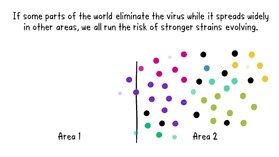COVID-19 vaccine
On March 6, 2021, vaccine developer Geert Vanden Bossche, who worked as senior Ebola program manager with the Global Alliance for Vaccines and Immunization in Geneva, published a paper that predicted potentially more dangerous variants to appear: “There can be no doubt that continued mass vaccination campaigns will enable new, more infectious viral variants to become increasingly dominant and ultimately result in a dramatic incline in new cases despite enhanced vaccine coverage rates. There can be no doubt either that this situation will soon lead to complete resistance of circulating variants to the current vaccines.”
Dr. Joseph Mercola explained that just as antibiotics breed resistance in bacteria, vaccines put evolutionary pressure on viruses to speed up mutations and create more virulent and dangerous variants.
“Viruses mutate all the time, and if you have a vaccine that doesn’t block infection completely, then the virus will mutate to evade the immune response within that person. That is one of the distinct features of the COVID shots — they’re not designed to block infection. They allow infection to occur and at best lessen the symptoms of that infection.”
Effectiveness
The real-world studies of vaccine effectiveness measure to which extent a certain vaccine has succeeded in preventing COVID-19 infection, symptoms, hospitalization and death for the vaccinated individuals in a large population under routine conditions that are less than ideal.[580]
Does the level of obfuscation created by the authorities affect vaccine effectiveness?
Variants
|
|
This section's factual accuracy may be compromised due to out-of-date information. The reason given is: Information taken from WHO's COVID-19 Weekly Epidemiological Update is outdated and inaccurate. The latest version now is July 20, edition 49. (July 2021)
|

The interplay between the SARS-CoV-2 virus and its human hosts was initially natural but is now being altered by the prompt availability of vaccines.[608] The potential emergence of a SARS-CoV-2 variant that is moderately or fully resistant to the antibody response elicited by the COVID-19 vaccines may necessitate modification of the vaccines.[609] Trials indicate many vaccines developed for the initial strain have lower efficacy for some variants against symptomatic COVID-19.[610] As of February 2021, the US Food and Drug Administration believed that all FDA authorized vaccines remained effective in protecting against circulating strains of SARS-CoV-2.[609]
Anyone wants to comment here?




